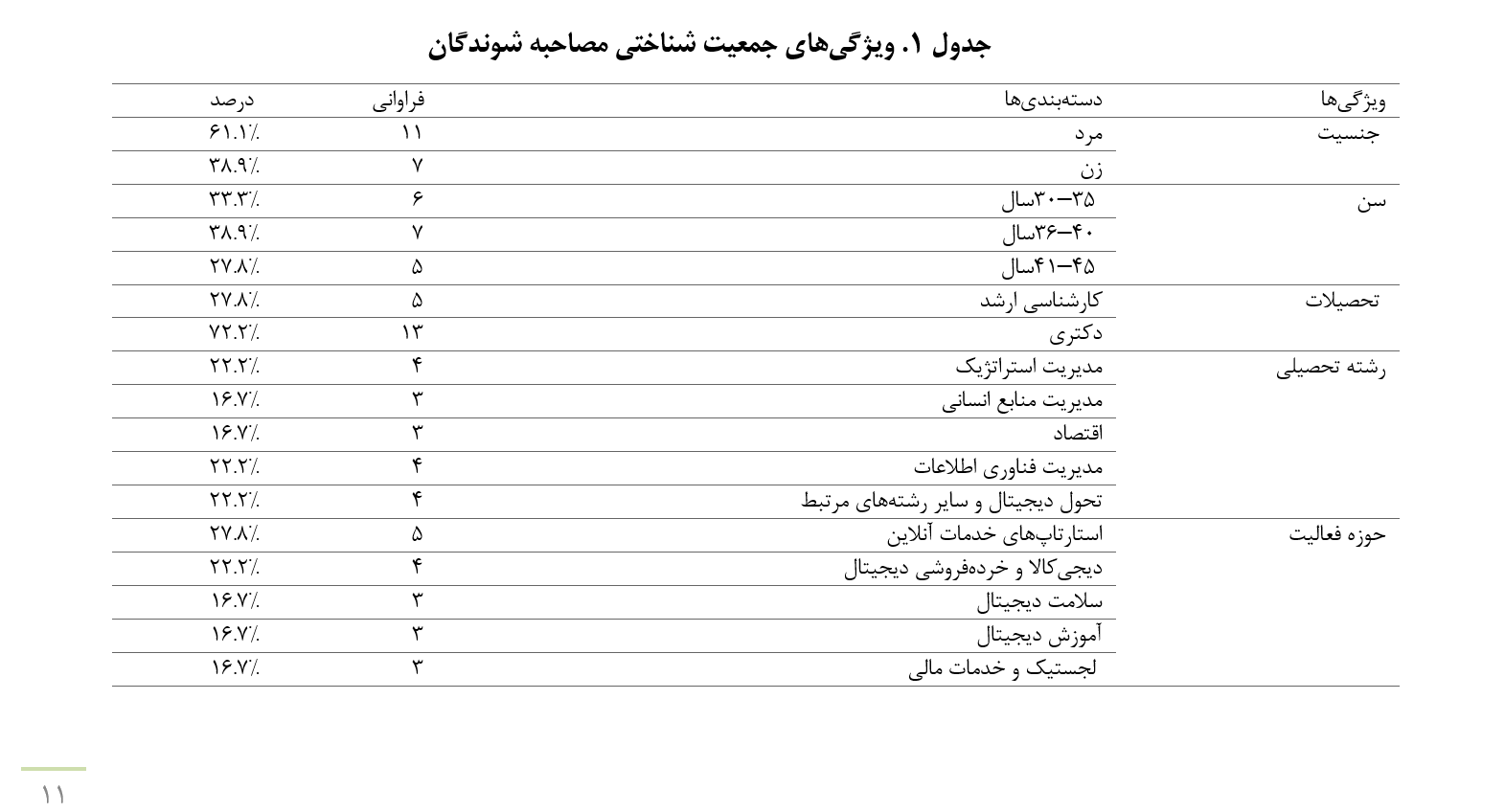Designing an Effective Leadership Model in Digital-Centric Organizations Based on Thematic Analysis Findings
Keywords:
Leadership, Effectiveness , Digital-oriented organizations , Thematic analysisAbstract
The aim of this study was to design an effective leadership model for digital-oriented organizations by identifying and explaining the components and interactions of digital leadership in the context of technological transformation. This qualitative research adopted an interpretive philosophy and used thematic analysis to identify behavioral and conceptual patterns of effective leadership. Data were collected through semi-structured interviews with 18 managers and entrepreneurs active in Tehran’s digital startups and businesses, selected purposefully based on theoretical saturation. Thematic analysis was conducted using Braun and Clarke’s six-phase framework to generate basic, organizing, and overarching themes. Four organizing themes were identified: (1) Transformational leadership in the digital context, encompassing daily digital engagement, continuous learning, and managing resistance to change; (2) Agility and flexibility within the innovative ecosystem, involving rapid decision-making, market adaptation, and resource optimization; (3) Effective communication in the digital era, emphasizing transparency, active participation, and digital collaboration; and (4) Employee empowerment and digital maturity, reflecting learning culture, digital skills development, and organizational digital culture. These converged into the overarching theme of “Integrated Digital Leadership,” representing a synthesis of technological and human dimensions of leadership. Effective leadership in digital organizations requires the integration of technological expertise, human competencies, and a transformational mindset. Digital leaders must leverage advanced technologies while fostering human capital development, promoting a learning-oriented culture, and ensuring agile decision-making under uncertainty. The resulting model offers both theoretical enrichment and practical guidance for achieving sustainable competitive advantage in the digital era.
Downloads
References
Ugwuja C. Transformational Leadership in the Digital Transformation Era: Strategies for Effective Organizational Change. Nijciam. 2024;4(2):108-13. doi: 10.59298/nijciam/2024/4.2.7108113.
Subiyanto D, Wahidah U, Septyarini E, Arjuna AB. Digital Leadership: Predicting Team Dynamics, Communication Effectiveness, and Team Performance. The Winners. 2024;25(1):35-47. doi: 10.21512/tw.v25i1.11678.
Lindov I. Leadership Impact on the Effectiveness in Digitalised It Organisations. Science International Journal. 2024;3(3):153-8. doi: 10.35120/sciencej0303153l.
Jameson J, Rumyantseva N, Cai M, Markowski M, Essex R, McNay I. A systematic review and framework for digital leadership research maturity in higher education. Computers and Education Open. 2022;3:100115.
Jafarpour Marzouni Z, Khorsandi Taskoh A, Abdollahinejad A. The skills and effective factors on improvement of university educational departments performance in the network community. Quarterly Journal of Research and Planning in Higher Education. 2022;28(3):1-23. doi: 10.52547/irphe.28.3.1.
Shah SS, Patki SM. Getting traditionally rooted Indian leadership to embrace digital leadership: challenges and way forward with reference to LMX. Leadership, Education, Personality: An Interdisciplinary Journal. 2020;2(1):29-40. doi: 10.1365/s42681-020-00013-2.
April K, Dalwai A. Leadership Styles Required to Lead Digital Transformation. Effective Executive. 2019;22(2):14-45.
Madzak A. Enhancing Remote Work Performance Through Effective Leadership. Journal of Information Systems Engineering & Management. 2025;10(10s):826-40. doi: 10.52783/jisem.v10i10s.1532.
Hashemi P, Shirbaghi N. Application of Grounded Theory to Present an Effective Leadership Model for Incompetent Teachers in Primary Schools. Research in Educational Leadership. 2024;8(30):6-48.
Barnes K, Vione KC, Kotera Y. Effective Leadership Practice Among Senior Leaders Working From Home and in the Hybrid Workplace Across COVID-19. Sn Business & Economics. 2024;4(5). doi: 10.1007/s43546-024-00651-4.
Gren L. What Makes Effective Leadership in Agile Software Development Teams? 2022. doi: 10.48550/arxiv.2201.08058.
Amrahi A, Ahanchian M, Salehi Fedardi J. A causal model of the relationship between cognitive processes and effective leadership of academic department chairs in Mashhad University of Medical Sciences. Quarterly Journal of Research and Planning in Higher Education. 2022;28(3). doi: 10.52547/irphe.28.3.25.
Pranitasari D. The Influence of Effective Leadership and Organizational Trust to Teacher’s Work Motivation and Organizational Commitment. Media Ekonomi Dan Manajemen. 2020;35(1):75. doi: 10.24856/mem.v35i1.1257.
Zainol NU, Kowang TO, Hee OC, Fei GC, Kadir BB. Managing Organizational Change through Effective Leadership: A review from Literature. International Journal of Academic Research in Business and Social Sciences. 2021;11(1):1-10. doi: 10.6007/IJARBSS/v11-i1/8370.
Rahimzadeh Kalaleh A, Ghiathinejad Nadoshan S, Rahimian H, Khorsandi Taskouh A, Ahmadizadeh F. A Systematic Review of Effective Leadership in Medical Sciences Universities. Research in Educational Systems. 2021;15(54):5-18.
Sedghi Boukani N, Seyedabbaszadeh M, Ghalavandi H, Hasani M. Analyzing the multiple relationships between effective leadership and strategic planning with human resource productivity in higher education centers of West Azerbaijan province. Productivity Management. 2018;12(2):31-69.
Amini A, Alimohammadlou M, Ja'fari A. Presenting an Integrated Model of Effective Leadership in Technology Adoption. Journal of Management Process and Development. 2019;32(4):153-88. doi: 10.29252/jmdp.32.4.153.
Banwart MC. Communication Studies: Effective Communication Leads to Effective Leadership. New Directions for Student Leadership. 2020;2020(165):87-97. doi: 10.1002/yd.20371.
Hitt D, Player D. Identifying and Predicting Effective Leader Practices: Examining Principal Experience and Prior Roles. Leadership and Policy in Schools. 2019;18(1):97-116. doi: 10.1080/15700763.2017.1384502.

Downloads
Published
Submitted
Revised
Accepted
Issue
Section
License
Copyright (c) 2025 Marzieh Nasiri Muselu (Author); Gholamali Tabarsa (Corresponding author)

This work is licensed under a Creative Commons Attribution-NonCommercial 4.0 International License.










